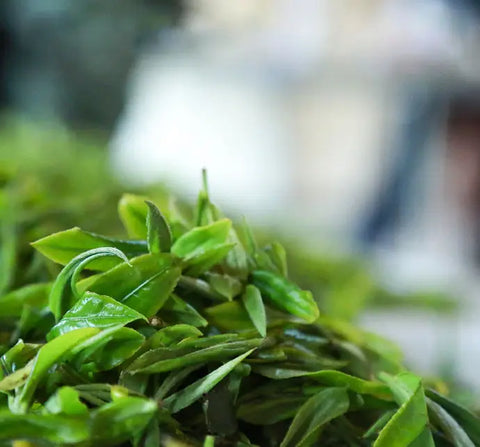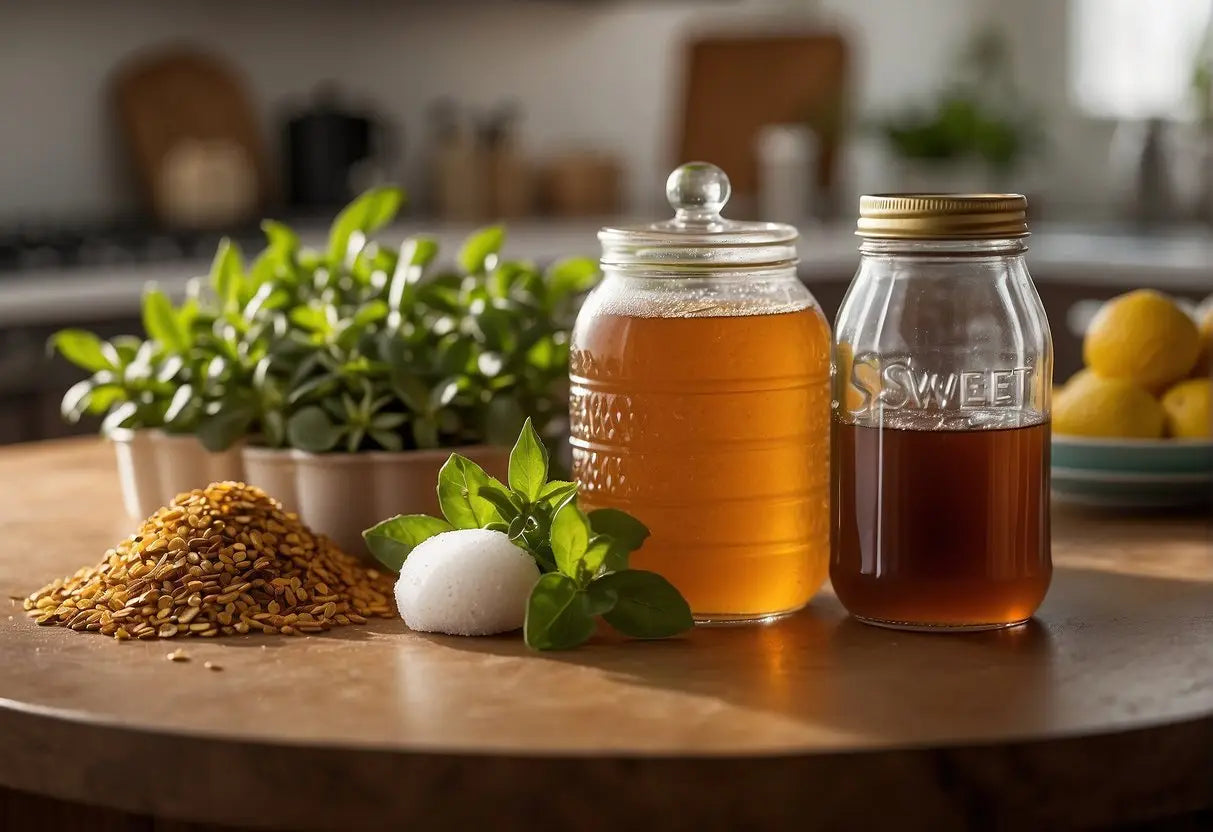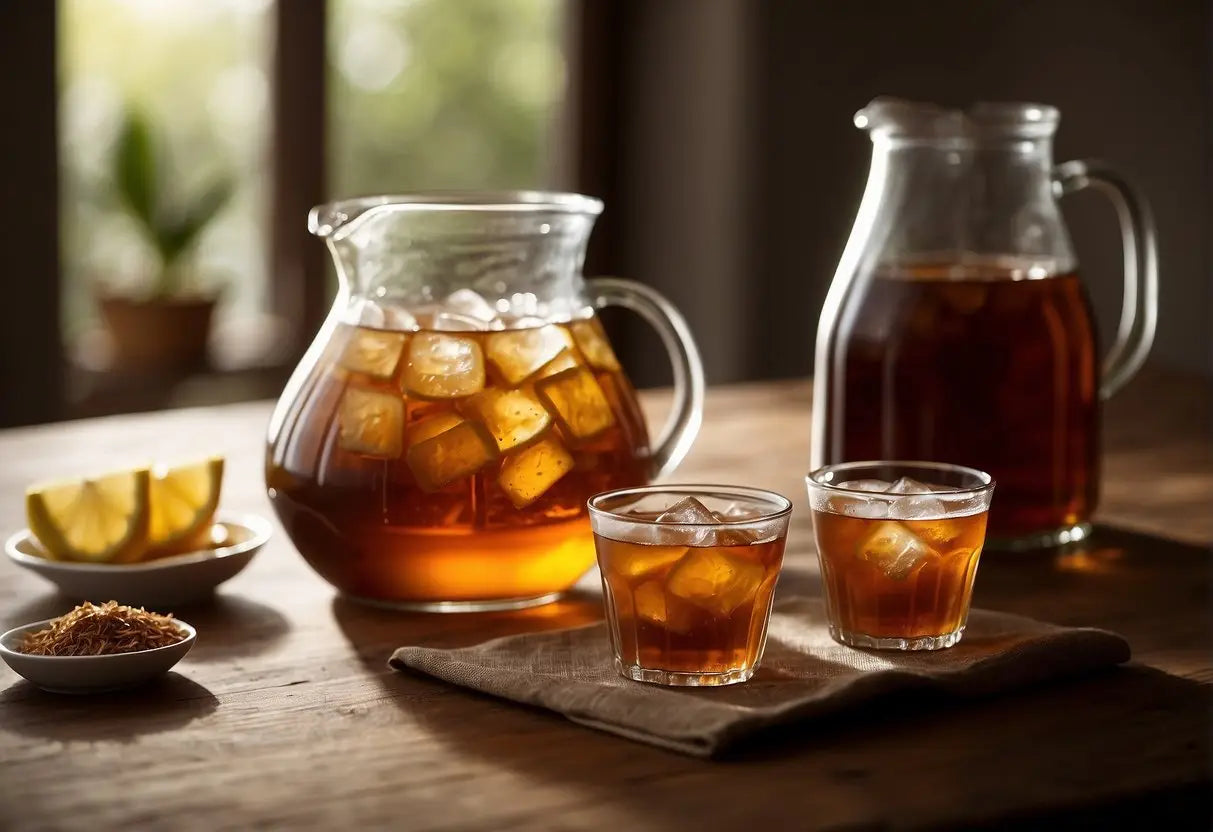How Much Sugar in a Gallon of Sweet Tea
Shop our Pu Erh Tea collections!
When you brew sweet tea, the sugar content can vary widely based on the recipe. Typically, a gallon of sweet tea contains between 1 and 2 cups of sugar. Here’s a basic breakdown:
- 1 cup of sugar: This amount is often found in lightly sweetened recipes and adds about 200 grams of sugar to your gallon of sweet tea.
- 2 cups of sugar: A more traditional Southern sweet tea might contain this much sugar, totaling around 400 grams.
To give you perspective, here's how the sugar content equates to common measurements:
Bestsellers
- Teaspoons (tsp): 1 cup of sugar equals 48 teaspoons.
- Grams (g): 1 cup of sugar is approximately 200 grams.
Based on these figures, here's how a gallon of sweet tea measures up:
| Sugar Added | Teaspoons (tsp) | Grams (g) |
|---|---|---|
| 1 cup | 48 tsp | 200 g |
| 2 cups | 96 tsp | 400 g |
It's important to understand your personal dietary needs and preferences when considering how much sugar to include in your sweet tea. Keep in mind that the American Heart Association recommends limiting added sugars to no more than 6 teaspoons (about 25 grams) per day for women and 9 teaspoons (about 38 grams) for men. This means that even a single cup of traditionally sweetened sweet tea could exceed these recommendations.
Check out our Sheng pu erh tea collection and Ripe pu erh tea collection.
Average Sugar Content by Recipe
 When you're crafting a gallon of sweet tea, the sugar content can vary widely depending on the recipe and the brand. Knowing these amounts helps you manage your sugar intake.
When you're crafting a gallon of sweet tea, the sugar content can vary widely depending on the recipe and the brand. Knowing these amounts helps you manage your sugar intake.
Homemade Sweet Tea Sugar Levels
For your homemade sweet tea, the sugar content can range from 1/2 to 1 1/2 cups of sugar per gallon according to standard recipes, which translates to approximately 100 to 300 grams of sugar. To provide perspective:
- 1/2 cup sugar = about 100 grams
- 1 cup sugar = about 200 grams
- 1 1/2 cups sugar = about 300 grams
Note that these figures can be adjusted based on personal sweetness preferences.
Commercial Sweet Tea Brands Sugar Content
Commercial sweet teas often contain added sugars that might exceed homemade levels. Here's a brief snapshot:
| Brand | Sugar per 1 Gallon |
|---|---|
| Brand A | 360 grams |
| Brand B | 340 grams |
| Brand C | 320 grams |
These values are based on nutritional information provided by the brands and can help you compare your homemade version to store-bought options.
Factors Influencing Sugar Quantity
The sugar content in a gallon of sweet tea can be affected by several controllable factors. Understanding these can help you manage the sweetness of your beverage to your preference.
Type of Tea Used
Different teas have varying natural sweetness levels and flavor profiles. For instance, black tea, commonly used for sweet tea, has a robust flavor that can mask the sweetness, potentially requiring more sugar to achieve a desired taste. In contrast, green tea has a milder taste, which may require less sugar.
Amount of Sugar Added
The amount of sugar you add directly influences the sweetness of your tea. A common sweet tea recipe may call for about 1 cup of sugar per gallon, but this can vary widely based on personal preference and the intended sweetness level.
Serving Size Considerations
When calculating the amount of sugar in your sweet tea, consider the serving size. One gallon equals 16 cups. If a gallon has 1 cup of sugar, each cup of tea would contain approximately 2 tablespoons of sugar. Adjusting the serving size will affect the sugar content per serving.
Lao Ban Zhang
Health Implications of Sugar in Sweet Tea
Consuming high amounts of sugar in sweet tea can significantly affect your health. Understanding the dietary guidelines and potential health impacts is crucial.
Dietary Guidelines on Sugar Intake
The Dietary Guidelines for Americans recommend that you limit caloric intake from added sugars to less than 10% of your total daily calories. For an average 2,000 calorie diet, this is equivalent to about 12 teaspoons or 50 grams of sugar per day.
Impact of Excess Sugar on Health
High sugar consumption, particularly from sweetened beverages like sweet tea, can lead to several health complications. These include:
- Weight Gain: Excess sugar is stored as fat in your body, contributing to weight gain and obesity.
- Type 2 Diabetes: Consuming too much sugar can increase your risk of developing type 2 diabetes by causing insulin resistance.
- Heart Disease: High sugar intake can lead to obesity, inflammation, high triglycerides, and blood pressure levels, all of which are risk factors for heart disease.
- Tooth Decay: Sugar interacts with bacteria within the plaque to produce acid that harms your tooth enamel and leads to decay.
Sugar Alternatives for Sweet Tea

When looking to reduce sugar intake or manage dietary restrictions, consider these substitute options for your sweet tea.
Natural Sweeteners
-
Honey: A natural sweetener that provides a distinct flavor, honey can sweeten tea without the need for processed sugar. To match the sweetness of one cup of sugar, use about 3/4 cup of honey.
-
Stevia: Derived from the leaves of the stevia plant, this natural alternative is much sweeter than sugar. One teaspoon can equate to a whole cup of sugar's sweetness.
-
Agave Nectar: Similar in consistency to honey, agave is a bit sweeter, so you’ll need less—about 2/3 cup for every cup of sugar.
-
Maple Syrup: While imparting a unique taste, maple syrup can replace sugar in a one-to-one ratio but is less sweet, so adjust according to taste.
Artificial Sweeteners
-
Sucralose (Splenda): A no-calorie sweetener that retains its sweetness when heated. Use about 1/3 cup of Splenda to replace one cup of sugar.
-
Aspartame (Equal, NutraSweet): Suitable for cold sweet tea, aspartame can lose its flavor when heated. One packet generally equals two teaspoons of sugar in sweetness.
-
Saccharin (Sweet'N Low): Another calorie-free option, use six packets of Sweet'N Low to equal the sweetness of one cup of sugar.
Preparing Low-Sugar Sweet Tea
Creating low-sugar sweet tea involves careful selection of ingredients and consideration of preparation methods to maintain flavor while minimizing sugar content.
Reducing Sugar in Homemade Recipes
-
Adjust the Sugar: Start with half the amount of sugar typically used in your recipe and taste the tea. You can slowly add more if needed, but often less sugar is required than you might think. A common starting point is ¼ cup per gallon of tea.
-
Incorporate Sweeteners: Experiment with low-calorie or zero-calorie sweeteners such as stevia, erythritol, or monk fruit extract. A teaspoon of stevia may equate to a cup of sugar in sweetness.
-
Enhance with Flavors: Add natural flavorings like mint, lemon, or orange slices to enhance sweetness perception without adding sugar.
Choosing Low-Sugar Commercial Brands
-
Read Labels: Always check the nutrition facts label. Look for teas with less than 10 grams of sugar per serving to make a more informed choice.
-
Compare Brands: Make a list of brands that offer low-sugar or sugar-free options. Brands such as Lipton, Pure Leaf, and Snapple have low-sugar versions that vary in taste and sweetness.
-
Consider Brew Strength: Some brands offer strong brew options that allow you to dilute the tea with more water, naturally reducing the sugar concentration per serving.
Label Reading and Sugar Content Awareness
 When selecting a gallon of sweet tea, examining the label on the packaging is crucial. Labels provide a breakdown of nutritional content, including sugar levels. Be sure to look for the Nutrition Facts section.
When selecting a gallon of sweet tea, examining the label on the packaging is crucial. Labels provide a breakdown of nutritional content, including sugar levels. Be sure to look for the Nutrition Facts section.
Key Aspects to Consider:
- Total Sugars: This line item shows the natural and added sugar content in grams per serving.
- Serving Size: Notate how many servings are in each gallon to determine total sugar intake.
- Added Sugars: Important to watch, as these are sugars added during processing.
Sugar Measurement Guide:
| Teaspoons of Sugar | Grams of Sugar |
|---|---|
| 1 tsp | 4 grams |
Remember, each 4 grams of sugar equals about 1 teaspoon. To convert total sugar grams in the gallon into teaspoons, divide the number by 4.
Awareness Tips:
- Explore sweet tea options with the label "unsweetened" and consider adding natural sweeteners yourself to control sugar intake.
- Check for phrases like "light" or "less sugar," but verify against the label as these terms are not regulated uniformly.
By reading labels and being aware of sugar content, you can make informed choices about consuming sweet tea and managing your sugar intake.
Frequently Asked Questions
In this section, you'll find precise information about sugar content in sweet tea and tips on tea bag selection for making large quantities.
What is the typical amount of sugar used in a recipe for one gallon of sweet tea?
For a gallon of sweet tea, recipes generally call for 1 to 2 cups of sugar, depending on your taste preference.
Can you suggest the best tea bags for creating sweet tea that will be served by the gallon?
Opt for large, family-size tea bags such as Lipton or Luzianne, which are specifically designed for brewing in larger quantities.
What is the amount of sugar present in a gallon of a popular brand like McDonald's sweet tea?
A gallon of McDonald's sweet tea contains about 1 cup of sugar, giving it a consistent sweetness that's widely recognized.
What's the recommended sugar measurement for sweet tea if I only want to prepare a quart or a half-gallon?
For a quart, use 1/4 to 1/2 cup of sugar; for a half-gallon, use 1/2 to 1 cup, adjusting to your personal taste.
How does the amount of sugar vary when using different brands, such as Lipton, for a gallon of sweet tea?
Different brands like Lipton might recommend varying sugar amounts, but on average you'll use 1 to 2 cups per gallon, similar to most recipes.
Is there a general guideline for the maximum amount of sugar that should be added to a gallon of sweet tea to ensure it's not overly sweet?
A guideline is to not exceed 2 cups of sugar per gallon. Start with less, taste, and add more if needed, to avoid overly sweet tea.
← Older post Newer post →











